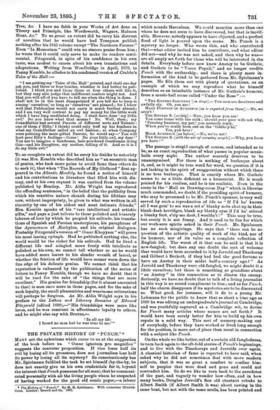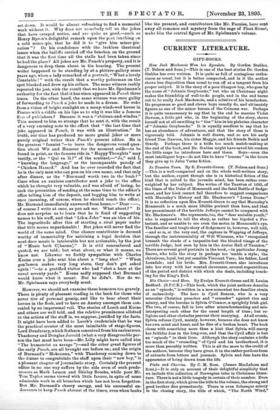THE PRIVATE HISTORY OF " PUNCH."*
MANY are the aphorisms which occur to us at the suggestion of the book before us. " Wane ignotam pro magnifico " suggests the converse proposition. If vice loses half its evil by losing all its grossness, does not journalism lose half its power by losing all its mystery ? So conscientiously has Mr. Spielmann fulfilled the task he set himself (by-the-by, he does not exactly give us his own credentials for it, beyond the interest that Punch possesses for all men), that he communi- cated personally with all the living people whom he suspected of having worked for the good old comic paper,—a labour * The History of "Punch." By if. H. llpielmann. With numerous Illustra- tions. London: Caesell and Co. 1895.
which sounds Herculean. We could mention more than one whom he does not seem to have discovered, but that is inevit- able. However, nobody appears to have objected, and a perfect flood of light is poured upon the scene. Mr. Punch is a mystery no longer. Who wrote this, and who contributed that—what editor invited him to contribute, and what editor did not—and why he was not asked, and then why he was— are all amply set forth for those who will be interested in the details. Everybody before now knew Anstey to be Guthrie, and Guthrie to be " Voces Populi," and no longer credits Punch with the authorship ; and there is plenty more in- formation of the kind to be gathered from Mr. Spielmann's pages. He fills them out with plenty of quotations, as an example of which we may reproduce what he himself describes as an inimitable instance of Mr. Guthrie's humour, from a music-hall scene called "Under the Rose" :—
"THE SISTERS SARCENET [on stage].—You men are deceivers and
awfully sly. Oh, you are !
MALE PORTION OF AUDIENCE [as is expected from them].—No, we
aren't !
THE SISTERS S. [archly].—Now, you know you are !
You come home with the milk ; should your poor wife ask why, Pressing business, my pet,' you serenely reply, When you've really been out on the tiddle-y-hi,' lies, you hare !
MALE AUDIENCE [as before].—No, we've not!
THE SISTERS S. [with the air of accusing angels].—Why, you know
you have !"
The passage is stupid enough of course, and intended so to be, as an exact reproduction of what passes in popular music- halls every night. The author scarcely deserves to be nnanonymised. For there is nothing of burlesque about it, and, as it might be true word for word, we question if it is not lacking in the spirit of exaggeration without which there is no true burlesque. That is exactly where Mr. Guthrie seems to us a little deficient as a humourist. He is much praised for his realism, and he is too realistic. Even in the scene in the Mall on Drawing-room Day" which is likewise much commended, we doubt if the presiding spirit of humour, who may be presumed to be Mr. Punch's sponsor, is very well served by such a reproduction of life as "If I'd ha' known all I was goin' to see was a set o' blanky nobs shut up in their blank-dash kerridges, blank my blanky eyes if l'd ha' stirred a blanky foot, s'elp me dash, I wouldn't !" This may be true, but surely it is not funny. And it used to be fun for which our work-sore spirits asked in their Punch. Mr. Spielmann has no such misgivings. He says that "there can be no question of the artistic quality of work of the kind, nor of its humour, nor of its value as a complete reflection of English life. The worst of it that can be said is that it is new-fangled; but does any one doubt the sort of welcome that would have been accorded to it by Jerrold and Thackeray and Gilbert ii. Beckett, if they had had the good fortune to have an Austey in their midst half-a-century ago ? " As Jerrold and Thackeray were old-fangled, we might doubt it a little ourselves; but there is something so grandiose about "an Anstey " in this connection as to disarm the enemy. Seriously, we have no doubt that to talk of a living journalist in this way is no sound compliment to him ; and as for Punch, half the charm disappears if its mysteries are to be discounted so. What good, for instance, will it do to a young Mr. Lehmann for the public to know that so short a time ago as 1889 he was editing an undergraduate's journal at Cambridge, and was youthfully captured as a Cambridge wit, to devise for Punch many articles whose names are set forth ? It would have been surely better for him to build up his own repute in a solid way. This sort of memory-making out of everybody, before they have worked or lived long enough for the position, is more out of place than usual in connection with a subject like Punch.
On the whole we like better, out of a certain old-fangledness, to turn back again to the oft-told stories of Punch's beginnings, and to live with the Thackerays and Jerrolds over again. A classical historian of fame is reported to have said, when asked why he did not sometimes deal with more modern subjects, that it was so great a comfort to confine him. self to peoples that were dead and gone and could not contradict him. So do we like to turn back to the anecdotes of the past, and vaguely to wonder how often, and in how many books, Douglas Jerrold's fine old chestnut rebuke to Albert Smith (if Albert Smith it was) about rowing in the same boat, but not with the same sculls, has been printed and set down. It would be almost refreshing to find a memorial work without it. Why does not somebody tell us the jokes that have escaped notice, and are quite as good,—such as Henry Byron's delightful remark upon the poet lunching on a cold mince-pie, that he did it to "give him mince-pie- ration "P Or his condolence with the luckless theatrical lessee when the bailiffs carried off the benches, on the ground that it was the first time all the stalls had been taken since he had the place? All jokes are Mr. Punch's property, and it is dangerous to drop them about in his hearing. The present writer happened to be standing by at a picture-gallery some years ago, when a lady remarked of a portrait, "What a lovely Constable !" with the result that a worthy policeman on the spot blushed and drew up his collars. The same witness rashly repeated the jest, with the result that we have Mr. Spielmann's authority for the fact that it has since appeared in Punch three times. On the other hand, the same witness was once guilty of forwarding to Punch a joke he made in a dream. He woke from a vision of bright sunlight on a many-windowed house in France with a riddle on his lips as to why it was like a famous firm of publishers ? Because it was a " clateau-and-windus." This seemed to him so strange that he sent it, with the result of a very amusing note to the effect that "the last time that joke appeared in Punch, it was with an illustration." In truth, our time has produced no more genial joker or more purely original writer than Punch's present editor. He is the greatest " funnist "—to leave the dangerous vexed ques- tion about Wit and Humour for the moment aside—to be found in print, as the famous ride in "Happy Thoughts" may
testify, or the " Qui va ?" of the sentinel,—"Je," said I, "knowing the language," or the incomparable parody of "Chicken Hazard." And has he ever recorded the fact that he is the only man who can pun on his own name, and that only after dinner, as the "Bur-nand worth two in the bush ?" Once when an anxious contributor sent a joke to the office which be thought very valuable, and was afraid of ' losing, he took the precaution of sending at the same time to the editor's office telling Lim of the deposit, and begging him to write at once (meaning, of course, when he should reach the office). Mr. Burnand immediately answered from home,—" Dear of course I write at once, as you ask me. What about ? " It does not surprise us to learn that he is fond of suggesting names to his staff, and that " Lik-a-Jolto " was an idea of his. The ingratitude after this of starting a rival paper under that title seems unpardonable ! Bat jokes will never find the world of the same mind. One chance contributor is deemed worthy of immortality for satirising a legal decision that next-door music is intolerable but not actionable, by the jest of "Music bath C[harms]." It is still remembered and noted, we are told ; but what about, or what it means, we know not. Likewise we feebly sympathise with Charles Keene over a joke sent him about a "long shot." "When genlemen makes very long shots, they don't get asked again ! "—to a gratified visitor who had "shot a bare at the usual seventy yards." Keene sadly supposed that Burnand would know what it meant. But he didn't. Nor do we. Mr. Spielmann says everybody must.
However, we should not examine these humours too gravely. There is plenty of pleasant reading in the book for those who never tire of personal gossip, and like to hear about their heroes in the flesh, and to have an .Anstey amongst them con- cealed by no impersonal veiL The stories of Leech and Keene and others are well told, and the relative prominence allotted to the artists of the staff is, we suppose, justified by the facts. It might have been added to Leech's credentials that he was the practical creator of the most inimitable of stage-figures, Lord Dundreary, which Sothern conceived from his caricatures. Thackeray and Douglas Jerrold (what a very disagreeable per- son the last must have been—Mr. Lilly might have called him "The humourist as savage ")—and the other great figures of the early Punch, are all brought out before us ; and the origin of Burnand's " Mokeanna," with Thackeray coming down to the dinner to congratulate the staff upon their "new boy," is a pleasant chapter of journalistic story. Certainly the present editor in no one way suffers by the side even of such prede- cessors as Mark Lemon and Shirley Brooks, while poor Mr. Tom Taylor seems viewed with little favour, in spite of some admirable work in all branches which has not been forgotten. But Mr. Burnand's cheery energy, and his successful en- deavours to keep Punch abreast of the times, even when books
like the present, and contributors like Mr. Farniss, have rent away all romance and mystery from the sage of Fleet Street, make him the central figure of Mr. Spielmann's volume.











































 Previous page
Previous page